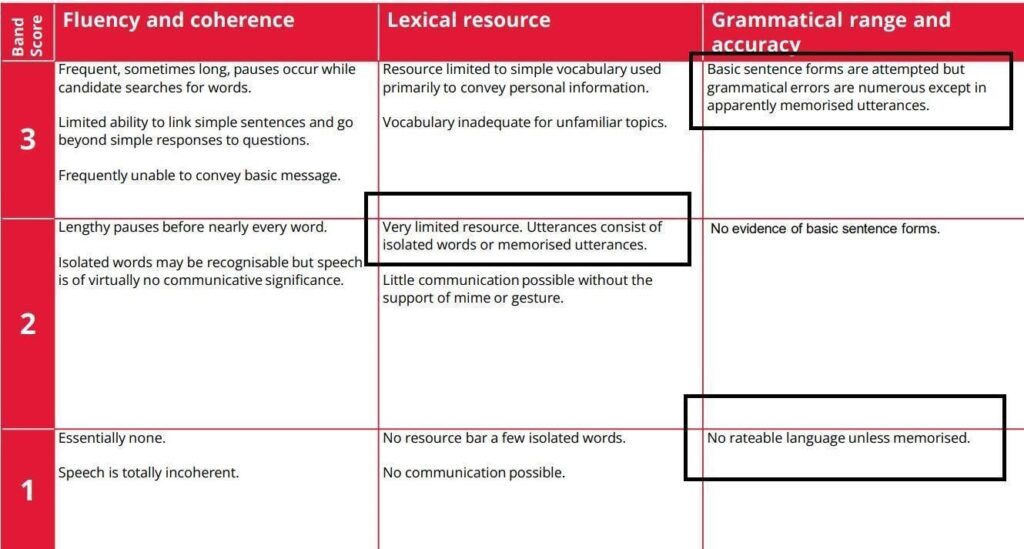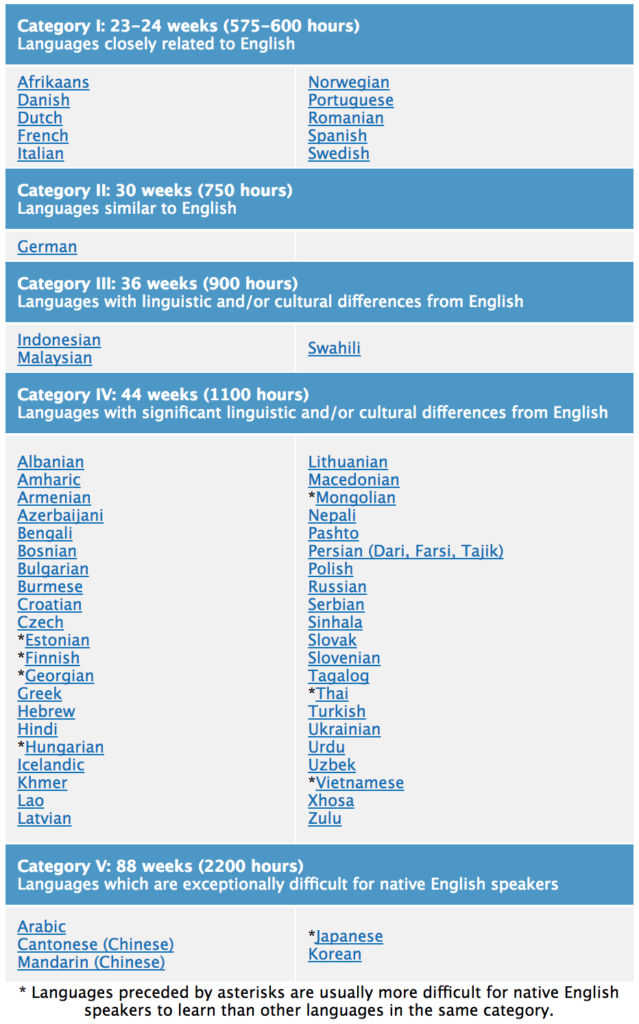Common Mistakes
Academic
A) Paraphrasing the chart using synonyms
Since 2015 the results in the speaking exam have been decreasing.

IELTS (2024) Results report [Online] IELTS Last Updated: June Available at: https://ielts.org/ [Accessed 9 August 2024]

IELTS (2024) Results report [Online] IELTS Last Updated: June Available at: https://ielts.org/ [Accessed 9 August 2024]

IELTS (2024) Results report [Online] IELTS Last Updated: June Available at: https://ielts.org/ [Accessed 9 August 2024]
You would expect the speaking results to increase in line with the reading and listening exams. However, this hasn’t happened because of inaccurate advice about the exam on websites, in videos and on social media. In this section of the document. I’m going to talk to you about all the bad advice offered online and show you why none of these pieces of advice increase your score.
General Advice for IELTS Speaking Test
Memorising Answers
Information: Memorizing answers or practicing answers for the exam is terrible for your score. This is because examiners focus on communication, and memorising is not communication. This means that examiners have to ignore anything memorised or practiced before the exam.
This lowers your score for the following reasons:
- It is not communication, which is what the exam is testing.
- It sounds unnatural.
- It often doesn’t connect with the question being asked.
- It shows no communication skill.
- It leads to inconsistent speaking.
- Examiners need to see you communicate during the exam.
- It can lead to the examiner asking you the wrong skills questions in part 3.

IELTS (2024) Results report [Online] IELTS Last Updated: June Available at: https://ielts.org/ [Accessed 9 August 2024]
IELTS Speaking Test Tips and Examples
Memorised Answers
EXAMPLE 1 (Beginner Student) Examiner’s question: Where is your hometown? Candidate’s answer: I love my hometown. Every time I walk along the beach and gaze out at the clear blue water, I look at the twinkling stars and I feel content that I live in the best place in the world. Analysis: This is clearly memorised. The candidate shouldn’t know these adjectives or be able to think of this immediately without pausing. Furthermore, their answer doesn’t connect with the question and the intonation will be all wrong. In part 3, they will suddenly stop speaking like this because they can’t use memorised answers. EXAMPLE 2 (Lower Intermediate Student) Examiner’s question: Are you working or studying? Candidate’s answer: I was working before but now I have decided to take a career break. It seems to be the time to head in a new direction. Analysis: This is clearly memorised. The candidate shouldn’t know these phrases or this grammar. The intonation will sound different and the chunking of language will suddenly change. This leads to inconsistent speaking which lowers your score. TIP: The more memorisation you have, the lower your score.Making What You Are Saying More Complicated
Introduction: Making what you say more complex does not increase your score. Most native speakers achieve Band 9 not because they are speaking in a complicated way but because they communicate clearly. 95% of what native speakers say in the exam is quite simple but 5% of it is very precise. They only use complicated precise language sometimes to communicate more clearly. If you use more complicated language but not for communication reasons, it causes communication problems. Communication is the most important thing for examiners and it comes above all other speaking criteria. EXAMPLE 1 Examiner’s question: Do you prefer coffee or tea? Candidate’s answer: I’m really into coffee and I drink it every day. Analysis: This is a confusing answer. You could just say ‘I prefer coffee’ which would be much better for communication. This will improve your score, saying ‘I’m really into coffee’ confuses the person listening and lowers your score dramatically. Because ‘being into coffee’ means that you enjoy talking about coffee, drinking it and that you know a lot about it but it doesn’t answer the question of whether you prefer it or not. You could also be ‘into tea.’ The reason they didn’t want to say ‘prefer’ or ‘like’ is because they have been told that these phrases are too simple. This doesn’t matter to examiners. What examiners care about is that you answer the question clearly. EXAMPLE 2 Examiner’s question: What do you like to do at the weekend? Candidate’s answer: I like to go to the pristine park in my city. Analysis: This is a confusing answer. You could just say ‘I like going to the park’ which would be much better for communication. This will improve your score, saying ‘I like to go to the pristine park in my city,’ confuses the person listening and lowers your score because parks are not by their nature pristine. It is not untouched countryside; it has been built as a green space for people to enjoy. In 90% of exams I used to do, I used to hear errors like this because candidates were trying to improve their score by using more complicated language. For precise language to improve your score, it has to be the clearest way to communicate what you want to say. It cannot be added to the exam. TIP: Don’t communicate above your natural level. It always lowers your score.Using Complex Language to Answer Simple Questions
The exam starts off with simple questions that test simple skills. The examiner wants to check that you can answer basic questions in English before asking you to do more complex things. We must check this before testing your higher-level skills. If you answer simple questions with complex language, it can be very confusing. Anything confusing in the exam lowers your score dramatically. EXAMPLE 1 Examiner’s Question 1: Do you prefer to eat at home or in a restaurant? Examiner’s Question 2: What is your favourite food to eat (at home / or in a restaurant)? Candidate’s answer: ‘I am really interested in Pizza.’ Analysis: This is quite confusing, ‘I am really interested in’ is for some kind of interest like ‘history’ or ‘physics’ it is for studying something. Also, the context of the conversation is about eating things, not studying them. They didn’t want to say ‘like’ because a video or teacher told them that this was too simple. The candidate has tried to communicate above their natural level and this has caused huge communication problems. This is terrible for your score and it happened in almost every exam I did. EXAMPLE 2 Examiner’s question: Do you like reading? Candidate’s answer: ‘I find intriguing pleasure in immersing myself in diverse literary genres, as it not only broadens my intellectual horizons but also provides a profound sense of achievement.’ Analysis: Examiners find this kind of answer really annoying, it also doesn’t make much sense and the candidate didn’t answer the question. None of this language improves your score because it is being used for non-communication reasons. Remember communication is what we are testing. EXAMPLE 3 Examiner’s question: Where is your hometown? Candidate’s answer: In talking about the places frequent. I must say that the seldom experience of one’s journey is to take the accommodations in one’s hometown. Analysis: You have tried to make it complicated and forgotten to answer the question. TIP: You don’t need to do this in the exam. Just answer the question directly and naturally.Adding Complex Sentences to Your Speaking
You don’t need to make the sentences more complex. This affects your chunking of language which lowers your score. Chunking of language is the sequence of words you can say without struggling to find the next word. When you try to make the sentences more complex above your natural level, your brain struggles to cope and this affects your fluency. EXAMPLE Examiner’s question: Do you prefer coffee or tea? Candidate’s answer: It could be.. said.. that one who enjoys hot beverage… should entice.. TIP: Making your sentences more complex lowers your score.Having More Complex Grammar
Your brain is naturally good at thinking of the correct grammar to communicate. Don’t try to make it more complex, your brain will struggle to cope and this will make your fluency worse. This will lower your score. EXAMPLE Examiner’s question: Have you been on holiday recently? Candidate’s answer: I have been going to France. Analysis: The candidate didn’t want to say ‘went’ because they thought it was too simple so they said ‘have been going to’ instead. This has caused big communication problems. The question was about ‘recently’ not over a long period of time. So your answer is very confusing. TIP: Never try to make things more complicated in the exam. It will lower your score dramatically.Saying as Much as You Can for Each Answer
Don’t do this in the exam. Just trying to say as much as you can does not improve your score. The exam is not a test of how much you can say. They are interested in how clearly and precisely you communicate. This lowers your score for the following reasons:- It leads to answers that don’t answer the question.
- I have to assume you don’t understand the question in the exam.
- It can also lead to fluency problems as you try to think of more and more things.
- It uses up precious time in the exam that the examiner could be using to test higher-level skills.
- It can lead to you repeating yourself.
- It makes it difficult for the examiner to time the answer of each question.
- Often you will answer the next question before it is asked.
- Examiners find it very annoying. We just want an answer to our question.
Not Answering the Question Directly
If you don’t answer the question directly, I have to assume that you don’t understand the question and also examiners find this very annoying. EXAMPLE 1 Examiner’s question: Are you working or studying at the moment? Candidate’s answer: Oh, I’ve been keeping myself busy with a variety of projects lately. I was working before but I quit my job and now I am study. It’s been a great opportunity to work more and earn some more and develop some skills that I’ve been wanting to improve for a while. Analysis: The examiner will be very confused by this answer because you didn’t answer the question directly. You mentioned that you quit your job but then talked about the money you are earning. TIP: Examiners hate it when candidates don’t answer the question directly.Memorising Complex Words Without Any Context
Many candidates either learn long lists of complex words or learn words directly from the dictionary. This is terrible for your score and leads to communication that is very confusing for the examiner. You must understand these things about a word before using it: the meaning, the context, the collocations, the form, the type and the resonance. If you don’t know all of these things, do not use a word. EXAMPLE 1 Examiner’s question: What do you like to do at the weekend? Candidate’s answer: I like to spend time in the lush park, with the deep undergrowth. Analysis: This candidate has tried to use more complicated language but their answer is very confusing.- ‘Lush’ = is for rainforests and jungle. You don’t use it for talking about most parks in cities.
- ‘Deep undergrowth’ = You would never have this kind of thing in a park because it would make it difficult for the visitors to walk around. Also ‘deep’ doesn’t collocate with ‘undergrowth.’
Using Idiomatic Language
Most candidates should avoid idiomatic language. If you are not likely to get Band 8 or above in the exam, it will lower your score. For idiomatic language to improve your score, it must be the most precise way to communicate something. If a simpler word can be used, it does not improve your score. Furthermore, it will only improve your score slightly but if you get it wrong, it will dramatically decrease your score. You must improve every aspect of your English before attempting to use very precise idiomatic language. EXAMPLE 1 (good example) “Yeah, I would say that you are along the right lines but you need to fix the last paragraph of your essay.” Analysis: This is good use of idiomatic language but it is very difficult for anyone other than a band 8 and above candidate. What the candidate is communicating here is: ‘Yes, I think that there are some good aspects to this and you are heading in the right direction but we still need to do some work before you have fully finished your essay.’ EXAMPLE 2 (bad example) “The project manager tried to hit the ground running, but the new system was a different kettle of fish, and it ended up being a wild goose chase.” Analysis: All of these idiomatic phrases are unnecessary and not used for communication. All of these could be replaced with more precise simpler phrases. Furthermore, the candidate didn’t understand the meaning of the phrases and used them in the wrong context. This lowers your score dramatically. The project manager started quickly, but the new system was different and challenging, so it was ultimately a waste of time. TIP: Never use idiomatic language to try and impress the examiner. It must come to you naturally during the exam. Most candidates should avoid idiomatic language.Looking at the Current Questions from the Exam
Looking at the current questions from the exam that some agencies provide online is terrible for your score. The reason for this is that examiners are testing your communication ability in a real-life situation. We need to be able to say that we can put you in an English-speaking country and you can communicate with people. In a real-life situation, you are not able to practice answers to the questions or read the questions before they are asked. This is why looking at the questions from the current exam lowers your score so much. This always leads to these things that lower your score:IELTS Speaking Test Tips
Why Memorising Answers Lowers Your Score
This always leads to these things that lower your score:
- Unnatural answers that examiners cannot examine.
- A range of language that you shouldn’t know at your level, because candidates look for ‘good words’ to use before the exam.
- In my experience, this also leads to more mistakes as you try to use more advanced language you found in a dictionary.
- Inconsistent speaking which is bad for your score. There is a big difference between part 1, part 2, and part 3. You cannot prepare answers for part 3, so this part sounds different.
- Answers that are said very quickly and can be difficult to understand.
- The candidate won’t listen to the examiner.
- Candidates sometimes even answer a question before you ask it.
- Some of these lists are inaccurate, and you may answer a question in the wrong way.
- This is a giant waste of time, and this time could be used improving your spoken English.
You cannot trick the examiner into thinking this is your natural communication, so I strongly recommend that you don’t even try. Focus on improving your ability to speak English.
TIP: Do not practice answers for the current speaking exam questions by yourself, with an app, or with a teacher.
Things That Increase Your Score
Introduction:
- Focus on communicating clearly.
- Speak clearly.
- Speak evenly.
- Speak naturally.
- Respond directly.
- Listen to the examiner.
How the Exam Works
Part 1
- Examiners test your basic skills in English.
- Examiners must repeat the exact words of the question.
- The examiner will interrupt you after 24 seconds to give each candidate the same amount of time to speak.
- Examiners start with the most basic skills and ask gradually more difficult questions during the exam.
Part 2
- Examiners test your ability to speak at length in English.
- They will give you one minute to think about a question and then two minutes to speak.
- You must answer the question they give you in the exam.
- If you don’t speak for one minute and a half, the examiner will say, “Can you tell me anything more about that?”
- If you don’t speak for two minutes, they will ask what is called the rounding-off question.
Part 3
- Examiner will ask you a series of questions based on 4 different skills in English (Opinion / Comparison / Speculation).
- There are two sets of questions. One for the higher levels and one for the lower levels.
- The examiner is examining you on how easy you find it to have a conversation in English. The easier that conversation is, the higher your score.
- The examiner is allowed to ask additional sub-questions.
- The examiner is allowed to paraphrase questions and ask you in a different way.
Know How to Do Each Part of the Exam
How to Do Part 1
- Speak slowly, clearly, evenly, and naturally.
- Answer the question directly.
- Answer the question and then stop speaking.
How to Do Part 2
- Speak slowly, clearly, evenly, and naturally.
- Speak for two minutes.
- Simple structure – beginning / middle / end.
- Use the sub-questions to structure your answer.
How to Do Part 3
- Speak slowly, clearly, evenly, and naturally.
- Answer the question directly.
- Answer the question and then stop speaking.

D) Focus on Improving Your English Speaking, Not on Improving Your IELTS Score
The FSI Institute is part of the diplomatic service of the United States. They publish a list of how long it takes to learn a language for English native speakers. You cannot start to prepare for your IELTS exam a few days beforehand. It takes significant amounts of the right kind of practice and dedication to get a high score.

